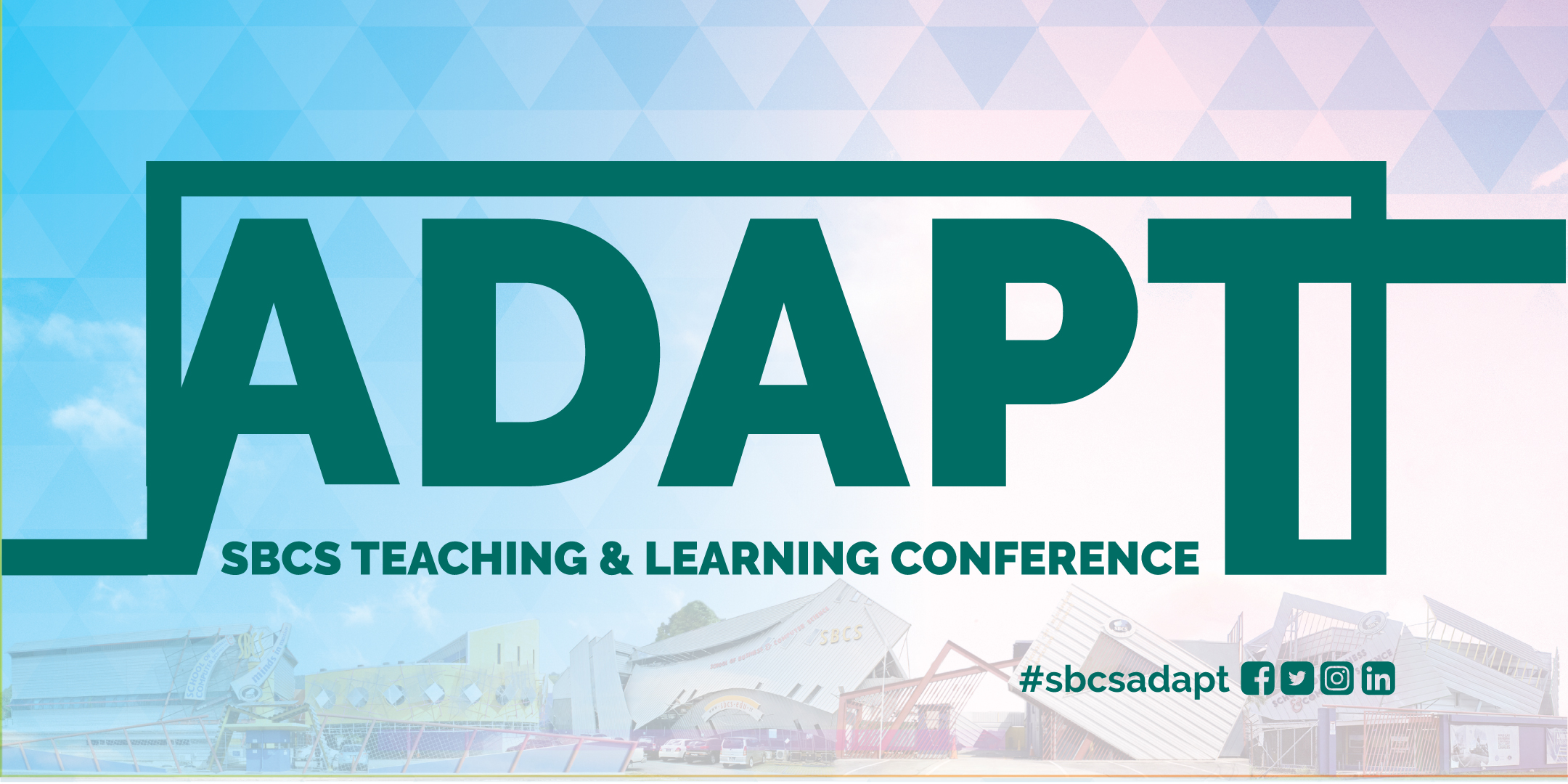News
ADAPTing to 21st Century Education – SBCS Global Learning Institute Hosts First Teaching & Learning Conference

Published: 10:38 AM on April 11, 2017
The first annual ADAPT (Academics Developing Alternative Pedagogical Techniques) conference took place on Thursday 6th April, 2017 at the SBCS Trincity Campus. The conference attracted educators and administrators from primary, secondary and tertiary levels, and covered three main strands of the theme, Enhancing Teaching and Learning in Education:
· 21st Century Teaching & Learning: Innovation in Education
· Managing in Academia: A Special Kind of Leadership
· Getting Them and Keeping Them: Student Engagement, Retention and Support
Conference Chair, Mr. Kevon Allen – Manager, Central Academic Administration described the event as a “coming of age” for SBCS; the institution having been involved in inspiring global learning for thirty years and being in a position now to share the lessons of that journey with the academic community. Held in partnership with the University of Greenwich (UoG), this year’s sessions were primarily delivered by facilitators and members (past and present) of SBCS’ cohorts of the UoG Postgraduate Certificate in Higher Education (PGCHE).
The Modern Educator
On the theme of Enhancing Teaching and Learning in Education, in his formal address, SBCS’ Executive Director, Robin Maraj reflected on his own past, where subject-matter expertise was the primary gauge of an educator’s prowess at teaching and learning. “However, this alone fails to cultivate 21st-century learning skills and competencies in our students today.”
He pointed out that critical thinking, for instance, has been seen as valuable since the time of Francis Bacon, and is thus not a modern concept. “However, it is still essential in transforming learners. In fact, education must be a transformative and not transactional experience. And it is this transformative experience that requires more of the educator and demands innovation in teaching and learning.”
His remarks provided an appropriate segue to the keynote address delivered by Mr. Michael Bradshaw – Executive Director, Accreditation Council of Trinidad & Tobago (ACTT), who spoke of the importance of continued professional development in the sector. Here, Mr. Bradshaw drew on his and his contemporaries’ experiences to provide insight into the evolution of pedagogy, andragogy, the impact of technology and the future of education. He described modern students as ‘digital natives’, while most educators are ‘digital immigrants’, and highlighted the need to innovatively use technology to build bridges between educators and their students.
Reaching the Modern Learner: Innovation in Technology, Academic Leadership & Communication
As the conference presentations got underway, the plenary session challenged the audience to consider innovative ways of meaningfully integrating technology in teaching, and was facilitated by a Senior Lecturer at SBCS, Mr. Derek Haqq. Concurrent sessions followed this; Mr. Martin Compton, Senior Lecturer in Teaching and Learning from the University of Greenwich and a facilitator on the PGCHE, shared various ways educators from all backgrounds can publish and share their insights and experiences on teaching and learning. He dispelled the notion that publishing is only an activity in the domain of full-time researchers, but can be an invaluable tool for any educator.
Dr. Prahalad Sooknanan, Senior Lecturer at the University of Trinidad and Tobago (UTT) and a graduate of the PGCHE, facilitated two sessions, one on the nature of leadership in tertiary education and the second on the challenge of transitioning local students from secondary to tertiary education.
Mr. Jonathan Felix, Senior Academic Programme Lead (Graphic Design) at SBCS spoke on the importance of formative feedback outside of the classroom. He motioned that in today’s 21st-century educational environment, pedagogical practices outside the classroom bear upon student success as much as commonplace classroom activities.
Reflections on the PGCHE
The PGCHE qualification is managed and delivered online by the University of Greenwich, with local administrative support from SBCS. For their presentation, a group of lecturers currently enrolled on the PGCHE spoke on their experience thus far on the programme. They talked about how it changed their teaching practice, course preparation; the experience of being mentored as well as peer-reviewed, and the experience of programme design. Additionally, Mr. Pernel Roberts, another one of SBCS’ 29 PGCHE graduates shared how his PGCHE experience shaped his current practice in programme design, small group teaching and student assessment, and even facilitated new career opportunities.
Looking Ahead
The full roster of speakers and their presentations will be available on the conference website. All of the sessions generated healthy discussion between presenters and participants, which will hopefully continue as persons return to their institutions and their teaching practice.
This inaugural conference was launched in part to celebrate 30 years of teaching and learning at SBCS Global Learning Institute. It is our hope that as the conference evolves, educators can meet, share ideas and work together and help shape, inform and participate in the national and international conversation on teaching and learning.